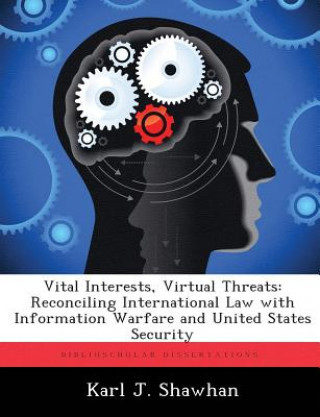
Kód: 08242542
Vital Interests, Virtual Threats
Autor Karl J Shawhan
The dominance of the U.S. military means that traditional threats, short of weapons of mass destruction, currently pose little risk to U.S. sovereignty. Non-traditional threats, however, pose asymmetric dilemmas for the United Sta ... celý popis
- Jazyk:
 Angličtina
Angličtina - Väzba: Brožovaná
- Počet strán: 102
Nakladateľ: Biblioscholar, 2012
- Viac informácií o knihe

Mohlo by sa vám tiež páčiť
-

Decameron of a Hypnotist, Etc.
31.63 € -3 % -

This is Not an Anthology
22.01 € -

Manhattan
33.48 € -

How Sweet It Was
39.93 € -

Leadership Genetic Engineering Formula
40.65 € -

Eulogy of Lawyers
41.46 € -

Rapid Penetration into Granular Media
142.23 €
Darujte túto knihu ešte dnes
- Objednajte knihu a vyberte Zaslať ako darček.
- Obratom obdržíte darovací poukaz na knihu, ktorý môžete ihneď odovzdať obdarovanému.
- Knihu zašleme na adresu obdarovaného, o nič sa nestaráte.
Viac informácií o knihe Vital Interests, Virtual Threats
Nákupom získate 172 bodov
 Anotácia knihy
Anotácia knihy
The dominance of the U.S. military means that traditional threats, short of weapons of mass destruction, currently pose little risk to U.S. sovereignty. Non-traditional threats, however, pose asymmetric dilemmas for the United States. The increased U.S. military and economic reliance on information systems introduces new vulnerabilities not adequately protected by traditional kinetic force arms. Additionally, international law does not adequately provide response mechanisms for the United States in case of a Computer Network Attack. The United States needs to establish policy directives and diplomatic initiatives to secure its information sovereignty for the future. This thesis examines the history of technology and sovereignty, which reveals a model for the evolution of international law. Specifically, the history of sea, air, and space provide examples on past issues of sovereignty. A three-stage pattern of international law emerges. Under the assumption that sovereignty issues related to information warfare will follow the same path, the current state of sovereignty regarding information is established. To focus the study, a functional outline for international convention, the International Regime for Information Security (IRIS), is advanced. IRIS balances U.S. domestic privacy needs with U.S. national security demands. Specifically, technology issues regarding digital identification and encryption are weighed against civil liberties and intelligence needs. After examining the advantages and disadvantages of the IRIS regime, this paper recommends its use as a model for a future international convention on information warfare. Within an IRIS-type regime, compromise between civil liberty advocates and intelligence service organizations are necessary. Through digital identification and universally strong encryption, privacy and security concerns will be satisfied.
 Parametre knihy
Parametre knihy
Zaradenie knihy Knihy po anglicky Society & social sciences Education
69.52 €
- Celý názov: Vital Interests, Virtual Threats
- Podnázov: Reconciling International Law with Information Warfare and United States Security
- Autor: Karl J Shawhan
- Jazyk:
 Angličtina
Angličtina - Väzba: Brožovaná
- Počet strán: 102
- EAN: 9781288306176
- ISBN: 9781288306176
- ID: 08242542
- Nakladateľ: Biblioscholar
- Hmotnosť: 195 g
- Rozmery: 246 × 189 × 5 mm
- Dátum vydania: 01. November 2012
Obľúbené z iného súdka
-

Oxford IB Diploma Programme: IB Economics Course Book
62.25 € -

OET Preparation
10.44 € -

Cambridge IGCSE (R) & O Level Complete Physics: Student Book Fourth Edition
38.70 € -

Business Partner B2 Workbook
16.89 € -4 % -

Business Partner B1 Workbook
17.50 € -10 % -

Imagine If...
10.95 € -24 % -

OET Reading Subtest Preparation
12.79 € -7 % -

Vol 2 Blackletter Lettering Adventures
27.03 € -

AS & A Level Maths For Dummies
19.65 € -18 % -

CompTIA Security+ Review Guide - Exam SY0-601
26.41 € -20 % -

Amazing Autistic Brain Cards
42.08 € -

Hanbo Jutsu: Use of Hanbo, Cane and Walking Stick for Self Defense
11.66 € -

Embodied Teen
21.80 € -17 % -

Blue Book of Grammar and Punctuation: An Easy- to-Use Guide with Clear Rules, Real-World Examples , and Reproducible Quizzes, Twelfth Edition
16.99 € -20 % -

Positive Discipline Tools for Teachers
18.53 € -3 % -

Oxford IB Diploma Programme: IB Theory of Knowledge Course Book
57.95 € -

Oxford IB Study Guides: Economics for the IB Diploma
44.03 € -

Speed and Accuracy: Division
8.59 € -

GCSE Spanish Exam Practice Workbook (includes Answers & Free Online Audio)
7.98 € -10 % -

KS3 Maths 10-Minute Weekly Workouts - Year 7
8.08 € -9 % -

Vertical Academy
37.27 € -

Grade 9-1 GCSE Maths AQA Revision Question Cards - Higher
10.85 € -

Human Landscapes from My Country
27.95 € -4 % -

Cambridge IGCSE (R) & O Level Complete Chemistry: Student Book Fourth Edition
42.49 € -

Oxford IB Diploma Programme: IB Course Preparation Mathematics Student Book
41.16 € -

1000 TRIOS or gapped sentences for Cambridge Advanced and Proficiency Exams
25.08 € -

Business Partner B1+ Workbook
16.89 € -4 % -

(ISC) SSCP SG & SSCP Practice Test Kit, 3e
70.65 € -23 % -

Einkorn
20.78 € -21 % -

Czech Verbs
40.34 € -

Motivation and Reinforcement
47 € -

Pearson Edexcel International GCSE (9-1) English Language B Student Book
53.75 € -

Read Write Inc. Phonics: Red Ditty Book Bag Books (Mixed Pack of 10)
67.48 € -

Oxford International Primary Maths Second Edition: Practice Book 1
13.10 € -

Forensic Linguistics Articles
17.60 € -

Corrected Squares of The Book of Abramelin
612.18 € -

Exam Prep for Microeconomics by Pindyck & Rubinfeld, 6th Ed.
45.77 € -

KS3 Maths 10-Minute Weekly Workouts - Year 8
8.08 € -9 % -

Reading Mind - A Cognitive Approach to Understanding How the Mind Reads
24.06 € -20 % -

Ganzheitliche Sprachförderung
32.66 € -

Internet Protocol over Link-16
69.52 € -

Effect of Registration Errors on Tracking in a Networked Radar System
69.52 € -

Princeton Review SAT Premium Prep, 2021
46.18 € -

CEH v11 Certified Ethical Hacker Study Guide + Practice Tests Set
75.57 € -5 % -

10 Practice Tests for the SAT, 2021 Edition
34.19 € -

OCP Oracle Certified Professional Java SE 11 Programmer II Study Guide - Exam 1Z0-816 and Exam 1Z0-817
49.86 € -7 % -

Prepared
33.89 € -

Powerful Teaching: Unleash the Science of Learning
28.77 € -20 % -

Physics for You
57.44 €
Osobný odber Bratislava a 2642 dalších
Copyright ©2008-24 najlacnejsie-knihy.sk Všetky práva vyhradenéSúkromieCookies



 21 miliónov titulov
21 miliónov titulov Vrátenie do mesiaca
Vrátenie do mesiaca 02/210 210 99 (8-15.30h)
02/210 210 99 (8-15.30h)